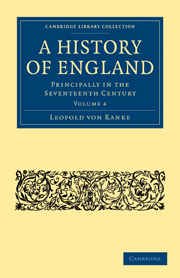Book contents
- Frontmatter
- Contents
- BOOK XVI THE LATER YEARS OF CHARLES II, 1675—1685 WHIGS AND TORIES
- BOOK XVII REIGN OF JAMES II, FEBRUARY 1685 TO SEPTEMBER 1688
- BOOK XVIII THE FALL OF JAMES II IN ITS CONNEXION WITH THE EUROPEAN CONFLICTS WHICH MARKED THE CLOSE OF 1688
- BOOK XIX COMPLETION OF THE REVOLUTION IN THE THREE KINGDOMS, 1688—1691
- INTRODUCTION
- CHAP. I William of Orange in London. Summoning of a Convention
- CHAP. II First sittings of the Convention. Debates on the vacancy of the Throne
- CHAP. III Elevation of the Prince of Orange to the English Throne. Constitutional limitations of the power of the Crown
- CHAP. IV James II in Ireland supported by help from France
- CHAP. V Dundee in the Scottish Highlands
- CHAP. VI Military events in Ireland in the year 1689
- CHAP. VII Dissensions in the Convention Parliament
- CHAP. VIII Dissolution of the Convention Parliament. First sittings of the Parliament of 1690
- CHAP. IX The Court at Dublin. Rivalry of the French and English Navies
CHAP. III - Elevation of the Prince of Orange to the English Throne. Constitutional limitations of the power of the Crown
Published online by Cambridge University Press: 07 September 2011
- Frontmatter
- Contents
- BOOK XVI THE LATER YEARS OF CHARLES II, 1675—1685 WHIGS AND TORIES
- BOOK XVII REIGN OF JAMES II, FEBRUARY 1685 TO SEPTEMBER 1688
- BOOK XVIII THE FALL OF JAMES II IN ITS CONNEXION WITH THE EUROPEAN CONFLICTS WHICH MARKED THE CLOSE OF 1688
- BOOK XIX COMPLETION OF THE REVOLUTION IN THE THREE KINGDOMS, 1688—1691
- INTRODUCTION
- CHAP. I William of Orange in London. Summoning of a Convention
- CHAP. II First sittings of the Convention. Debates on the vacancy of the Throne
- CHAP. III Elevation of the Prince of Orange to the English Throne. Constitutional limitations of the power of the Crown
- CHAP. IV James II in Ireland supported by help from France
- CHAP. V Dundee in the Scottish Highlands
- CHAP. VI Military events in Ireland in the year 1689
- CHAP. VII Dissensions in the Convention Parliament
- CHAP. VIII Dissolution of the Convention Parliament. First sittings of the Parliament of 1690
- CHAP. IX The Court at Dublin. Rivalry of the French and English Navies
Summary
It is not by Parliamentary discussions that great constitutional questions, in which each party thinks itself in the right, can be decided. Such decisions can only be arrived at in consequence of events which give one side or the other the preponderance. An event of this kind had now come to pass in England. Because James II had overstrained the prerogative to attain an end lying outside its natural province, its opponents had gained the victory over him: he himself was excluded from the throne; they were the masters in the country. Now, however important it was to fill up the vacant throne, this was by no means the only matter affecting the general interest which came under discussion. On the contrary, another matter was connected with it which, in the eyes of many, possessed even more importance, namely, the decision of the questions pending between the Crown and the Parliament, as to the extent of the prerogative. The general desire was not merely to exchange one prince for another, but, as Lord Falkland said, who spoke after Wharton, to secure the country against the return of an arbitrary government, and to remove all doubt as to the extent of the royal power. ‘Before you fill the throne I would resolve what power you will give the King and what not.’ It was Sir Richard Temple, who on this occasion, as on the previous one, decided the course which the debate should take.
- Type
- Chapter
- Information
- A History of EnglandPrincipally in the Seventeenth Century, pp. 502 - 528Publisher: Cambridge University PressPrint publication year: 2010First published in: 1875



